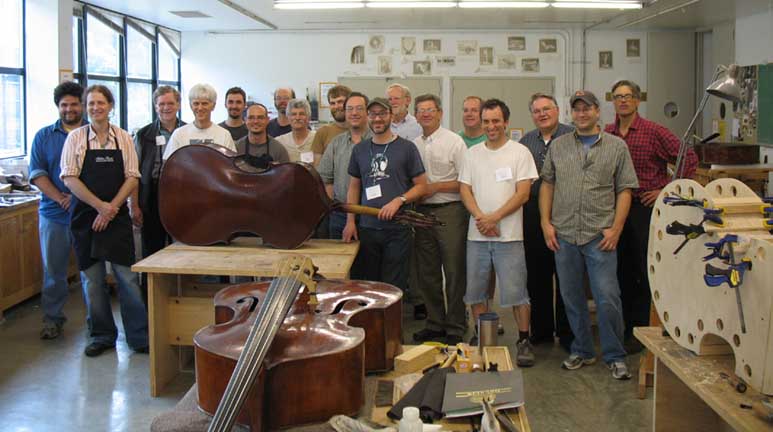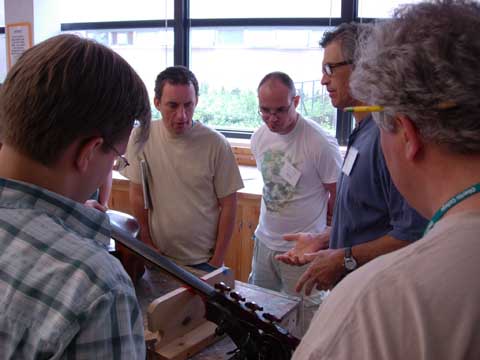

The second VSA/Oberlin Bass Workshop is scheduled for the week of June 10-16, 2012. We're looking forward to another busy but rewarding week, working together.
"Everyone teaches, everyone learns," is the basic principal established by Vakahn Nigosian, founder of the program at Oberlin. With this in mind, the Bass Workshop will bring together those interested in bass lutherie, with a mind toward sharing experience, knowledge, and ideas.
We anticipate that most participants will be professionals working in shops, perhaps bass specialists, or those in violin shops wanting to learn more about bass. We also expect we'll have some space for experienced amateurs, wanting to further develop their skills. The hope is that everyone will leave business and competitive concerns at home, with the belief that by helping each other, we raise the standards of our profession to the benefit of all.
The faculty this year will be David Gage, Arnold Schnitzer, and Jay VandeKopple. Jim Ham is working on another project, so will be attending the Acoustics Workshop this year, but he plans to stop by regularly and participate in a few projects. So I (Jay VK) have agreed to coordinate the Workshop, and will be the contact person for questions, applications, etc. In addition, Chris Dungey will be back for further discussion of wolftones and setup. And Rodney Mohr has offered to spend time with us on bass bow topics again.
Tuition for this year has been set at $650, and dormitory housing at $225 (no A/C). Also, remember that the VSA sponsors this program, so attendees are expected to be VSA members. Lunch will normally be on your own. We've generally liked to have dinner together, and this year we're working with the University about using a cafeteria. (Campus space is at a premium this year, as there's an alumni event going on, so a kitchen really isn't available.)
We'll be meeting again the same week as the Acoustics Workshop, so are planning more cross-discussion. One of the Directors for that program is Fan Tao of D'Addario, a world leader in developing bass strings, and George Stoppani, an acoustic scientist, bass maker, and maker of gut strings, plus many world class scientists and instrument makers from all over the world.
About half of the week's schedule will be presentations and demonstrations by the faculty, guests, and attendees. For a given topic the idea is not to show THE way to do it, but to share approaches or explore how things work and find out! We will actively seek and encourage contrasting ideas from all participants.
The rest of each day (and evening) will be devoted to projects. We will bring some projects for people to work on, but encourage participants to bring projects as well. As we get closer to the Workshop, I'll contact everyone about what you're planning, and we'll create a Project List. Then on the first day, we'll have attendees decide which Project Teams they'd like to work with (more than one is likely, depending on how much needs to be done). When Project Teams get together, they can decide on how to share the work. I'd like each Team to have a Project Leader, who would help pull it together.
As an example, we'd like to have a Tailpiece Project that would investigate different tailpiece weights, different string afterlengths, different tailwire lengths, and also some wolf suppressors. And I hope Ted White will show us some work he's done on tailpiece measurement, as well as his design for an adjustable tailpiece. We also have the Project Bass that we started work on last time, and hope to get repairs moving along as far as we can.

While things will change when we get your project ideas, some topics we hope
to include:
1. General issues
-sharpening tools
-glue considerations
-setup specification guidelines
2. The fingerboard
-fitting, shaping and surfacing
-arco/pizz vibration of the string, how they differ and affect the fingerboard
3. The bridge
-methods of fitting
-selection and adaptation to players needs (classical/jazz)
4. The sound post
-fitting
-adjustment for sound and playability
5. Cracks
-causes and repair approaches ("ideal world" vs. real world)
-Innovative approaches to major repairs using vacuum bagging and steam
6. The bassbar
-methods of fitting
-approaches to repairing bassbar cracks
7. Making considerations
-designs and implications of the modern player; travel designs
-building techniques
-considering various materials and wood species
8. The tailpiece
-effect of weight and tailwire attachment
-adjustment of string afterlengths and use of wolf suppressors
9. The bow
-rehairing and repairs
10. Wolf notes
-what causes them
-how to cope with them
11. Acoustics of the double bass
-what's been done
-what's being done
-how can we use it?
12. Bass strings
-Comparisons of a variety of brands/models
So participants should bring tools, ready to get to work. It would be great also to bring favorite tools and jigs. As we all have to develop many of our own tools, it doesn't make sense for each of us to recreate the wheel. This should be a wonderful environment where we can share ideas, helping to move our profession forward.
For further information or an application form, contact:
Jay VandeKopple
vandekopple@fordham.edu
Faculty bios
After studying string bass with Bill Blossom, David Gage studied string bass performance with David Neubert and Reggie Workman at the University of Massachusetts, while playing electric bass with various local bands in the New England area. Moving to New York City in 1976 to study with Dave Holland and Michael Moore, David apprenticed in The Bass Shop of Chuck Traeger in New York City. At this time David traveled to study acoustics and instrument construction/repair with Carleen Hutchins in New Jersey and Lou DiLeone in Connecticut.Arnold E. Schnitzer was born on 1953 in Miami, Florida, where his father ran a cabinet shop servicing the art deco buildings of South Beach. The family, originally from the New York City region, moved back north in 1957 and he grew up in that area. After High School he received a conservatory degree in music performance/composition, achieved while working full-time playing double and electric bass in various venues. His interest in woodworking was encouraged from an early age by his father, and included experiences in boat repair, carpentry and "fixing" his own instruments. Much later, he was mentored in guitar-making by Carl Thompson, and in double bass repair by Lou DiLeone. Mr. Schnitzer's non-luthiery careers have included music instruction, sales, executive recruiting, and residential carpentry. Since 1990 he has worked exclusively as a luthier and run the small business AES Fine Instruments, currently in Brewster, NY. His hobbies include golf and sailing, and he has a weakness for nice sports cars. Along with countless repair jobs, modifications and restorations, he has hand-built 29 double basses to date. He and his wife Barbara live and work on a horse farm where neither gets enough sleep. He has two grown children; his daughter is an accomplished opera singer, and his son (currently in his senior year at college) no longer lets Dad win when golfing. Arnold writes a column for Bass Gear Magazine, and participates with David Gage and Jim Ham in the ongoing Luthier's Corner column in the ISB magazine, Bass World.
Jay VandeKopple is a member of the VSA Board of Directors.
He had been President
of the Catgut Acoustical Society from 1999 until its merger with the VSA in
2004, and continues as Chair of the CAS Forum. He is a retired Professor of
Math/CIS, formerly at Marymount College of Fordham University. Jay has a Ph.D.
in Mathematics (with a thesis in a musical acoustics area) and a Masters in
Computer Science. An accomplished bass player, Jay freelances in the Northern
NJ area. His wife, Linda McKnight, is on the Double Bass Faculty and Manhattan
School of Music and Montclair State University in NJ. Jay has run his own bass
shop for over 35 years, part-time until his retirement from teaching in 2007
and continuing full-time since then. Jay is now beginning to make basses. His
first teacher in bass repair was Joseph Cilecek of Hastings, NY, and he studied
under Karl Roy at the UNH Violin Craftsmanship Institute.